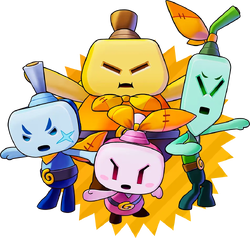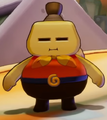IDLE: Difference between revisions
MaxTaylor08 (talk | contribs) m (→Loog) Tag: Mobile edit |
MaxTaylor08 (talk | contribs) m (→Dulles) Tag: Mobile edit |
||
| Line 114: | Line 114: | ||
|FreEM=From the second letter in ''ZÉROS'' ("IDLE") | |FreEM=From the second letter in ''ZÉROS'' ("IDLE") | ||
|FreEC=<ref name=FLBRTH/> | |FreEC=<ref name=FLBRTH/> | ||
|SpaA=Pat | |||
|SpaAM=From the second syllable in ''Simpáticos'' ("IDLE") | |||
|SpaE=Morris | |SpaE=Morris | ||
|SpaEM=From the second syllable in ''Remolones'' ("IDLE") | |SpaEM=From the second syllable in ''Remolones'' ("IDLE") | ||
Revision as of 23:20, November 11, 2024
This article is about a subject in an upcoming or recently released game. When the game is released, or more information about this subject is found, this article may need major rewriting.
This notice should be removed after a month has passed since the game was first released.
| IDLE | |||
|---|---|---|---|
 IDLE in Mario & Luigi: Brothership | |||
| First appearance | Mario & Luigi: Brothership (2024) | ||
| Species | Concordian humanoids | ||
| |||
- “We're not idle! We're IDLE!”
- —IDLE, Mario & Luigi: Brothership[1]
IDLE is a group of characters who appear in Mario & Luigi: Brothership. They are a team of four Concordian children, each with a yellow-orange band tied around a different part of their body. Its name is an acronym made up of the initials of their members:[1]
- Ireen, a short, pink Concordian who wears her band as a hair bow and is the self-proclaimed leader of the group.
- Dulles, a lanky green Concordian with his band tied around his antenna.
- Loog, a short blue Concordian wearing his band as a scarf.
- Ellow, a stocky yellow Concordian wearing his band as a cape.
Princess Peach, Starlow, and a Dorrie join the group after the Color-Full Sea Great Lighthouse Island is relit; Peach wears her band around her right arm, and Dorrie wears one around its neck, but Starlow does not wear one.
Profiles
- Website description:
- English (American):
IDLE
A group of rambunctious kids who are eager to help, but not very good at it.[2] - Japanese:
サビレッタ島で出会うグミ、ズレッタ、グレール、 ズンドー の4人の子どもたち。マリオたちと出会い、 その活躍を目の当たりにして一緒に世界を取り戻そうと協力する。[3]
(Translation: Four children, Gumi, Zuretta, Grail, and Zundō, who are encountered on Sabiretta Island. After encountering Mario and friends and witnessing their accomplishments, they decide to team up in order to take back the world.) - French (Canada):
Un groupe d’enfants bruyants qui sont impatients d’aider... mais maladroits par contre.[4]
(Translation: A group of noisy kids who are excited to help... but clumsy on the other hand.) - Portuguese (Brazil):
Um grupo de jovens bagunceiros que estão sempre dispostos a ajudar, mesmo não sendo muito bons nisso.[5] - Spanish (Latin America):
Un grupo de chicos bulliciosos que están dispuestos a ayudar, pero a veces no les salen bien las cosas.[6]
- English (American):
Names in other languages
| Language | Name | Meaning | Notes |
|---|---|---|---|
| Japanese | グズグズ団[3] Guzuguzu Dan |
Lingering Group | |
| Chinese | 拖拉拖拉团[?] Tuōlatuōla Tuán |
Lingering Group | |
| Dutch | Team G.A.A.P.[7] | From gaap ("yawn") | |
| French (NOA) | POLARITÉ[4] | Rough homophone of "polarity" | |
| French (NOE) | LES ZÉROS[8] | Zero, in a pejorative way | |
| German | Team WYRG[9] | Possibly from würg ("choke") | |
| Italian | N.E.T.T.Y.[10] | Possible portmanteau of inetti ("incapable") and an English-like diminutive of connettere ("connect") | |
| Portuguese | Estáticos[5] | Statics | |
| Spanish (NOA) | Los Simpáticos[6] | The Sympathetics | |
| Spanish (NOE) | Los Remolones[11] | The Stubborn Ones, contains the colloquialism molón ("cool") |
Ireen
| Language | Name | Meaning | Notes |
|---|---|---|---|
| Japanese | グミ[3] Gumi |
From the first syllable in「グズグズ」(Guzuguzu, "IDLE") and Japanese female name ending「み」(-mi) | |
| Chinese | 拖米[?] Tuōmǐ |
From the first syllable in「拖拉拖拉」(Tuōlatuōla, "IDLE") and Chinese female name ending「米」(-mǐ) | |
| Dutch | Gussie[7] | From the first letter in G.A.A.P. ("IDLE") | |
| French (NOA) | Polariana[12] | From the first syllabe in POLARITḖ ("IDLE") | |
| French (NOE) | Zeboce[13] | From the first letter in ZÉROS ("IDLE") | |
| German | Wibke[9] | From the first letter in WYRG ("IDLE") | |
| Italian | Nelly[10] | From the first letter in N.E.T.T.Y. ("IDLE") | |
| Portuguese | Esther[14] | From the first two syllabes in Estáticos ("IDLE") | |
| Spanish (NOA) | Sim[15] | From the first syllable in Simpáticos ("IDLE") | |
| Spanish (NOE) | René[16] | From the first syllable in Remolones ("IDLE") |
Dulles
| Language | Name | Meaning | Notes |
|---|---|---|---|
| Japanese | ズレッタ[?] Zuretta |
From the second syllable in「グズグズ」(Guzuguzu, "IDLE") and likely the Italian surname "Letta" | |
| Chinese | 拉雷塔[?] Lāléitǎ |
From the second syllable in「拖拉拖拉」(Tuōlatuōla, "IDLE") and Chinese male name ending「塔」(-tǎ) | |
| French (NOA) | Lassuperius[12] | From the second syllabe in POLARITḖ ("IDLE") | |
| French (NOE) | Ḗtofraiz[13] | From the second letter in ZÉROS ("IDLE") | |
| Spanish (NOA) | Pat[?] | From the second syllable in Simpáticos ("IDLE") | |
| Spanish (NOE) | Morris[16] | From the second syllable in Remolones ("IDLE") |
Loog
| Language | Name | Meaning | Notes |
|---|---|---|---|
| Japanese | グレール[?] Gurēru |
From the third syllable in「グズグズ」(Guzuguzu, "IDLE") and "rail" (a possible reference to his short body) | |
| Chinese | 拖雷尔[?] Tuōléiěr |
From the third syllable in「拖拉拖拉」(Tuōlatuōla, "IDLE") | |
| French (NOA) | Rigelio[12] | From the third syllabe in POLARITḖ ("IDLE") | |
| French (NOE) | Rebel[13] | From the third letter in ZÉROS ("IDLE") | |
| Spanish (NOA) | Tico[?] | From the third syllable in Simpáticos ("IDLE") | |
| Spanish (NOE) | Lolo[16] | From the third syllable in Remolones ("IDLE") |
Ellow
| Language | Name | Meaning | Notes |
|---|---|---|---|
| Japanese | ズンドー[?] Zundō |
Pun on the fourth syllable in「グズグズ」(Guzuguzu, "IDLE") and possibly「寸胴」(zundō, without a defined waist) | |
| Chinese | 拉多[?] Lāduō |
From the fourth syllable in「拖拉拖拉」(Tuōlatuōla, "IDLE") | |
| French (NOA) | Térébellio[12] | From the fourth syllabe in POLARITḖ ("IDLE") | |
| French (NOE) | Oazif[13] | From the fourth letter in ZÉROS ("IDLE") | |
| Spanish (NOA) | Cos[?] | From the fourth syllable in Simpáticos ("IDLE") | |
| Spanish (NOE) | Néstor[16] | From the fourth syllable in Remolones ("IDLE") |
Gallery
Peach and Starlow alongside IDLE
References
- ^ a b Nintendo Life (October 21, 2024). We've Played EVEN MORE Mario & Luigi: Brothership. YouTube. Retrieved October 21, 2024.
- ^ Mario & Luigi™: Brothership for Nintendo Switch. Nintendo.com. Retrieved October 15, 2024.
- ^ a b c マリオ&ルイージRPG ブラザーシップ! : STORY キズナをつなぐ物語. Nintendo.com (Japanese). Retrieved October 15, 2024.
- ^ a b Mario & Luigi™: Brothership pour Nintendo Switch. Nintendo.com (Canadian French). Retrieved November 3, 2024.
- ^ a b Mario & Luigi™: Brothership para Nintendo Switch. Nintendo.com (Brazilian Portuguese). Retrieved November 3, 2024.
- ^ a b Mario & Luigi™: Brothership para Nintendo Switch. Nintendo.com (Latin American Spanish). Retrieved November 3, 2024.
- ^ a b Nintendo Nederland (October 10, 2024). Mario & Luigi: Brothership – Tijd voor een (b)roerig avontuur! (Nintendo Switch). YouTube. Retrieved November 3, 2024.
- ^ Nintendo France (October 10, 2024). Mario & Luigi : L'épopée fraternelle – Une grande aventure maritime ! (Nintendo Switch) (1:38 - 4:44). YouTube. Retrieved October 20, 2024.
- ^ a b Nintendo DE (October 10, 2024). Mario & Luigi: Brothership – Ein Inselhopping-Abenteuer wartet! (Nintendo Switch). YouTube. Retrieved November 3, 2024.
- ^ a b NintendoItalia (October 10, 2024). Mario & Luigi: Fraternauti alla carica – L'Elettria ti aspetta! (Nintendo Switch). YouTube. Retrieved October 28, 2024.
- ^ Nintendo España (October 10, 2024). Mario & Luigi: Conexión fraternal – Una aventura de isla en isla (Nintendo Switch). YouTube. Retrieved October 19, 2024.
- ^ a b c d Mario & Luigi: Brothership in-game name (Canadian French localization)
- ^ a b c d Mario & Luigi: L'épopée fraternelle in-game name (European French localization)
- ^ Nintendo Portugal (October 10, 2024). Mario & Luigi: Brothership (Nintendo Switch) – Uma aventura marítima! (4:44). YouTube. Retrieved November 3, 2024.
- ^ Mapache Rants (November 4, 2024). ¿Vale la pena Mario & Luigi: Brothership? (10:25). YouTube. Retrieved November 4, 2024.
- ^ a b c d ErSeFiRoX (November 6, 2024). Isla Desolita // MARIO & LUIGI: CONEXIÓN FRATERNAL (5:27). YouTube. Retrieved November 11, 2024.





